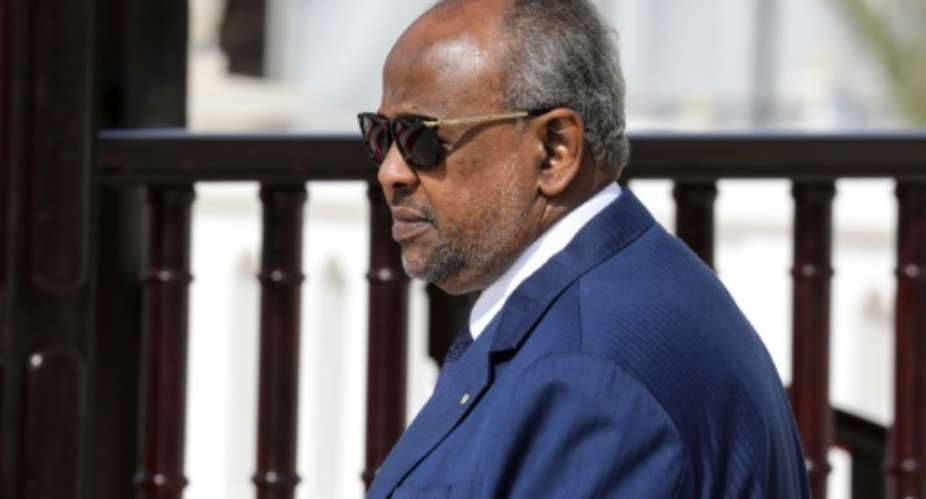Djibouti President Ismail Omar Guelleh's regime is facing a wave of protests triggered by the detention of a military officer who had denounced discrimination and corruption in the tiny Horn of Africa nation.
Hundreds took to the streets of Djibouti city on June 4 before being brutally dispersed by police, who then made spot arrests throughout the capital, according to an AFP reporter.
The following day, police used live ammunition on a crowd in Ali Sabieh, the country's second-largest city, wounding several people and arresting others, human rights organisations said.
A new demonstration was again held on Monday in the sprawling district of Balbala in the capital, and on Tuesday, security forces were omnipresent in the city.
 Map of Djibouti where protests have occurred after the detention of a military officer who denounced corruption. By Thomas SAINT-CRICQ (AFP)
Map of Djibouti where protests have occurred after the detention of a military officer who denounced corruption. By Thomas SAINT-CRICQ (AFP)
The protestors are outraged over a video shot by Air Force Lieutenant Fouad Youssouf Ali from his cell in Gabode prison in Djibouti city, where the regime is accused by rights activists of detaining opponents and sometimes using torture.
A small, highly strategic country that is simultaneously home to French, US, Chinese and Japanese military bases, Djibouti has been ruled with an iron fist since Guelleh became president in 1999.
In the video, which was posted online, Ali showed his cell, a tiny windowless room only equipped with dirty latrines.
The pilot, who has been in prison since April 22, filmed himself with a mobile phone and revealed what appeared to be injuries to his legs caused by physical abuse.
'Persecution'
He complained about the conditions of his imprisonment and worried that he would never get out alive.
"He could die at any moment," said his lawyer Zakaria Abdillahi, who says Ali needs to be hospitalised and has obtained court approval for a medical assessment.
Abdillahi, who was able to see his client on Wednesday for the first time since May 13, told AFP on Thursday that Ali has "begun a hunger strike".
Ali came to the public's attention at the end of March when he published a first video saying he was persecuted because of his clan, and attacking the nepotism which he said prevailed in the army.
The same day, he fled to Ethiopia to seek political asylum. He was arrested on April 8 by the Ethiopian police and handed over to Djibouti a few days later.
"This gentleman was kidnapped, he was not extradited," Abdillahi said.
"As far as I'm concerned, he's been arbitrarily detained since April 11... He's someone who was kidnapped and held captive, which is a criminal offence," he said.
The government has reacted through its official media, a rare move when opponents are arrested.
"For once, there is pressure from the public... This authoritarian regime is afraid," said Abdillahi, who also accused the police of harassing Ali's family.
Charged with treason
Djibouti's attorney general, Djama Souleiman Ali, said the lieutenant had tried to steal a military plane to fly to Eritrea but failed to take off and damaged the aircraft.
He has charged him with treason, which carries a life sentence but which Abdillahi said "makes no sense".
Relations between Djibouti and Eritrea are strained by a long-standing unresolved border dispute over Ras Doumeira, a strategic cape overlooking the entrance to the Red Sea north of Djibouti city.
Ali "called for insurrection and revolt and that's not acceptable for any country," Djibouti's ambassador to Ethiopia, Mohamed Idriss Farah, told AFP.
Benedikt Kamski, a researcher at the Germany-based Arnold-Bergstraesser-Institute (ABI) said that while the current protests remained relatively small, and were likely to fizzle out, they were mainly a sign of dissatisfaction with the government ahead of elections which are meant to take place next year.
"Large parts of the population are dissatisfied with the president and the government, especially due to (allegations of) widespread corruption and the lack of delivering basic services to the population.
"Also unemployment and underemployment are particularly big issues."
The protests also come as Djibouti is dealing with the highest prevalence of the coronavirus on the continent. A lockdown has been lifted but a travel ban is still in place and people's livelihoods have been hit hard.
str-rcb-cyb-fb/erc/pma





 2024 elections: Resign if you can't be faithful to party - Sagnarigu NDC PC desc...
2024 elections: Resign if you can't be faithful to party - Sagnarigu NDC PC desc...
 Five arrested, remanded over alleged murder of two police officers at Transacco
Five arrested, remanded over alleged murder of two police officers at Transacco
 Tax exemptions better than incentives for churches – Tax Analyst tell Bawumia
Tax exemptions better than incentives for churches – Tax Analyst tell Bawumia
 Transport Minister sues Law Platform Editor for defamation
Transport Minister sues Law Platform Editor for defamation
 Voter registration: Police arrest NPP Treasurer for Mpohor for registering minor
Voter registration: Police arrest NPP Treasurer for Mpohor for registering minor
 "This nonsense must stop" — Lawrence Tetteh vows to march to Jubilee House over ...
"This nonsense must stop" — Lawrence Tetteh vows to march to Jubilee House over ...
 2024 elections: “If indeed you stand for peaceful elections the time is now for ...
2024 elections: “If indeed you stand for peaceful elections the time is now for ...
 I have the attributes to be president of this country — Bernard Monarh
I have the attributes to be president of this country — Bernard Monarh
 Cecilia Dapaah saga: ‘Turf war’ between AG, EOCO, OSP indicates they’re not ‘cor...
Cecilia Dapaah saga: ‘Turf war’ between AG, EOCO, OSP indicates they’re not ‘cor...
 Ghana will become the first African country to embrace blockchain-powered gover...
Ghana will become the first African country to embrace blockchain-powered gover...
